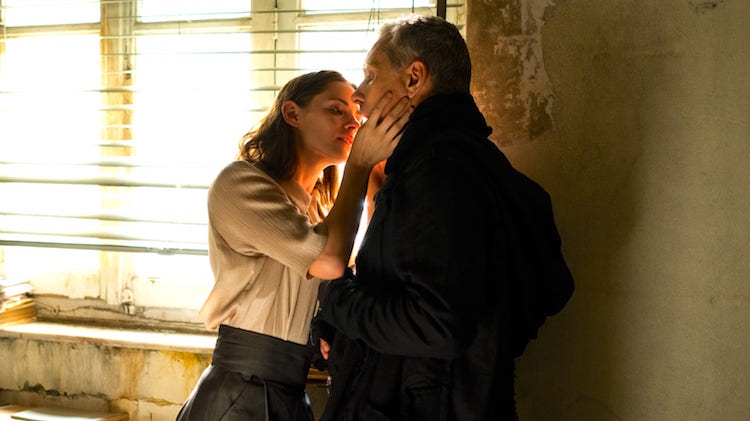Although one might expect David Cronenberg’s Crimes of the Future to deliver several cringe-inducing scenes given the festival press swirling around it, the film is actually rather subdued in terms of its adherence to the “body horror” genre generally connected with the filmmaker’s other works. That being said, while it may not be the finest example of the Cronenberg ethos, it is easily one of the more thought-provoking and interesting films of his career.
In the auteur’s latest exploration of the body politic, Cronenberg surmises that human evolution has adapted to encompass life in a synthetic environment. This has allowed some human bodies to transform and mutate (though not necessarily for identifiable or specific evolutionary purposes). Harnessing this new genetic oddity, performance artist Saul Tenser (Viggo Mortensen), presents the metamorphosis his body undergoes as a series of “avant-garde” performances along with his partner Caprice (Léa Seydoux). However, when investigators from the National Organ Registry (one named Timlin is played by Kristen Stewart) become involved with his latest exhibition, it appears that the next stage of human evolution is at hand.
Arriving eight years after his last film, Maps to the Stars (2014), Crimes of the Future signals a return to his roots of sorts. Though not in the sense that the film is at all associated with his 1970 short film of the same name, but rather in that the film concerns itself with the relationship of human evolution with regards to whether biology or sociology are superior avenues. In some ways, the film is Cronenberg at his best, and in others it is everything that those who dislike most of his work will find equally displeasing. That being said, the film is a welcome return to the cinema for one of the most original and thought-provoking filmmakers of the last half century.
Viggo Mortensen delivers a tense and ethereal performance as performance artist Saul Tenser, who may also be working for the very system his art seems abhorrently opposed to. Similarly, Léa Seydoux’s Caprice is equal partner and victim as she aids Tenser with his performances and undergoes her own body modifications. Kristen Stewart’s Timlin however, plays as the somewhat confused, yet enraptured surrogate for the audience as the film moves along.

Kristen Stewart and Viggo Mortensen in “Crimes of the Future.”
Douglas Koch’s cinematography affords the film the otherworldly, yet somehow familiar, appearance that is present in Carol Spier’s production design. An engaging and haunting soundtrack courtesy of Howard Shore only heightens the overall mood and tone of the film.
While Cronenberg may be revisiting some of his earlier obsessions in part with Crimes of the Future, he is also offering a new way of looking at the politics of the human body, and emotional wellspring of evolution itself. Although it may not achieve the heights of his best work, Crimes of the Future is a film well worth exploring and engaging with.

| Producer: | Robert Lantos, Panos Papahadzis, Steve Solomos |
| Release Date: | June 3, 2022 (limited) |
| Running Time: | 107 minutes |
| Starring: | Viggo Mortensen, Léa Seydoux, Kristen Stewart, Scott Speedman, Welket Bungué, Don McKellar, Yorgos Pirpassopoulos, Tanaya Beatty, Nadia Litz, Lihi Kornowski, Denise Capezza |
| Writer: | David Cronenberg |
| MPAA Rating: | Rated R (for strong disturbing violent content and grisly images, graphic nudity and some language) |
| Director: | David Cronenberg |
| Distributor: | NEON |
| External Info: | Official Site / #crimesofthefuture |

